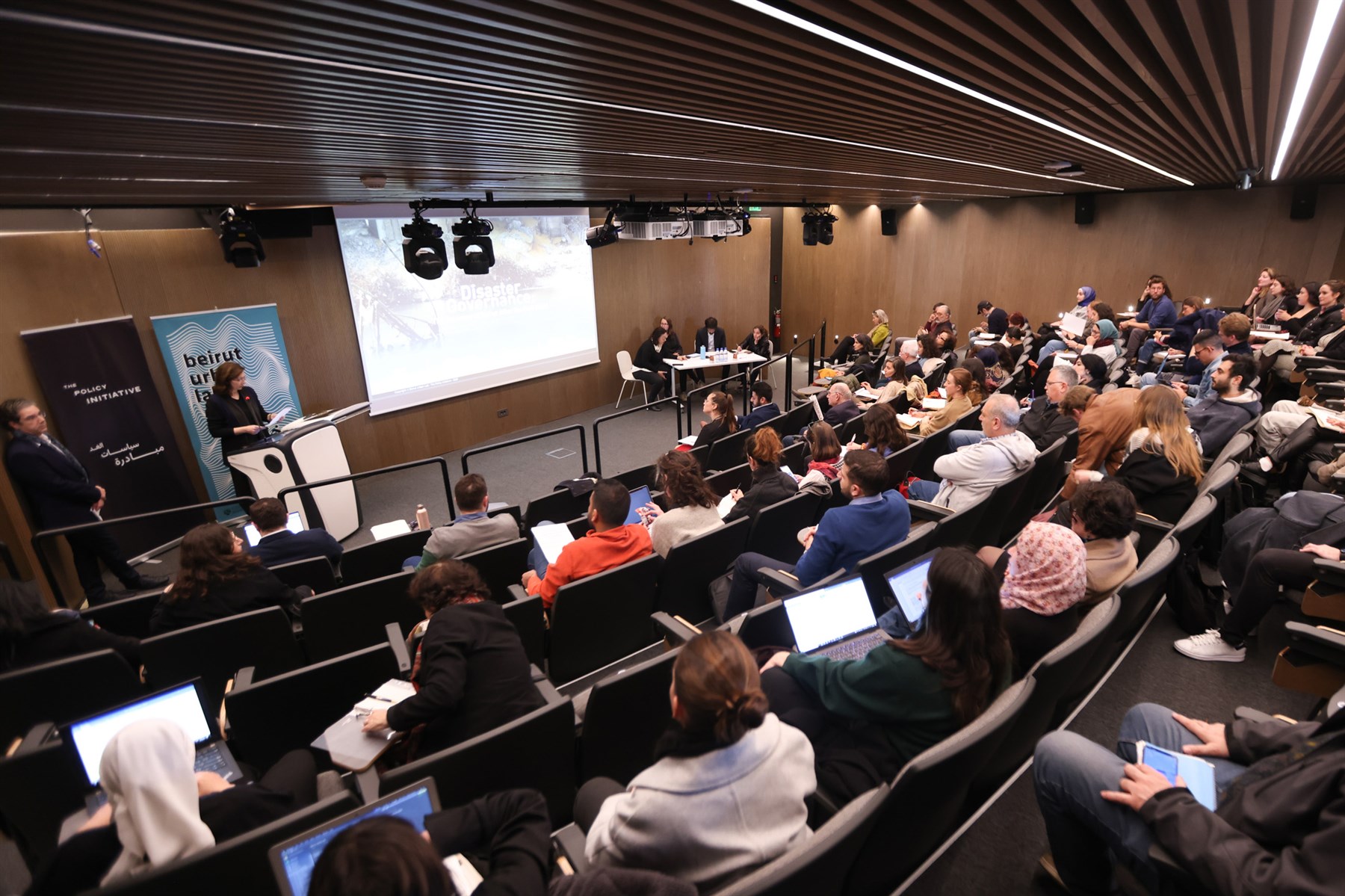BUL and TPI hold Disaster Governance seminar on the recovery of Beirut after the Port Blast

How effective has the Recovery, Reform and Reconstruction Framework (3RF), the aid program created for Lebanon by the European Union, the World Bank and UN-agencies in response to the Beirut Port Blast of August 2020 been? In the absence of a public-led response, who were the multiple actors who intervened on the ground and responded to the urgent needs of repair and recovery? What does this multi-scalar hybrid governance arrangement inform us about state making and city-making in Lebanon?
These were the key questions that the Beirut Urban Lab (BUL) and The Policy Initiative (TPI) addressed in a public seminar held on February 15, 2023, at the American University of Beirut, titled "Disaster Governance: the Recovery of Beirut after the Port Blast." This seminar summarized the research study co-directed by Dr. Mona Harb (BUL) and Dr. Sami Atallah (TPI), funded by the IDRC.
The seminar was organized in two panels. In the first panel entitled “International Organizations and Disaster Governance: Assessing Lebanon’s 3RF,” which was moderated by Kawthar Dara (UNDP) and discussed by Carole Alsharabati (USJ and Siren Associates), Sophie Bloemeke (BUL) and Wassim Maktabi (TPI) explored the 3RF and the extent to which it contributed to the adoption of reforms. Findings showed that the 3RF’s institutional novelty of including CSOs did not materialize in effective policy advocacy. Furthermore, 3RF’s outcomes, more than two years after its creation, were limited: the yield of legislative reforms was low and comparable to previous aid programs, while main outcomes were limited to project-making rather than institutional building.
Luna Dayekh (BUL) and Hussein Cheaito (TPI) presented the second panel, entitled “Mapping Actors and the Provision of Goods in the Neighborhoods Affected by the Blast,” which was moderated by Salim Rouhana (World Bank Group) and discussed by Alia Nazar-Farhat (Al-Majmoua and LHDF). They presented the results of a survey mapping more than 85 actors who provided goods after the blast, profiling them in terms of age, size, locational characteristics, partnerships, and actors’ portfolio of good provision, identifying a complex and hybrid governance landscape, including national and international NGOs and faith-based organizations as well as political groups, and universities. The study also mapped these actors according to their provision of goods, identifying those who delivered low-value particularistic goods and those leaning towards community-focused, long-term, collective goods. The presentation closed with a focus on actors who provided collective goods, arguing they are contributing to city-making through micro-urbanism interventions.
Sami Zoughaib (TPI) concluded the seminar with reflections on how the BUL-TPI’s investigation of the post-blast recovery response at the macro and meso-scales challenges conditional aid as an effective vehicle of reform and raises concerns related to the role of CSOs as alternative providers of collective goods given their lack of representation and accountability. He also noted that such findings interrogate broader issues related to the urgent need to rethink the political economy model of Lebanon and processes of state-building.
Watch the video recording of the seminar here.
These were the key questions that the Beirut Urban Lab (BUL) and The Policy Initiative (TPI) addressed in a public seminar held on February 15, 2023, at the American University of Beirut, titled "Disaster Governance: the Recovery of Beirut after the Port Blast." This seminar summarized the research study co-directed by Dr. Mona Harb (BUL) and Dr. Sami Atallah (TPI), funded by the IDRC.
The seminar was organized in two panels. In the first panel entitled “International Organizations and Disaster Governance: Assessing Lebanon’s 3RF,” which was moderated by Kawthar Dara (UNDP) and discussed by Carole Alsharabati (USJ and Siren Associates), Sophie Bloemeke (BUL) and Wassim Maktabi (TPI) explored the 3RF and the extent to which it contributed to the adoption of reforms. Findings showed that the 3RF’s institutional novelty of including CSOs did not materialize in effective policy advocacy. Furthermore, 3RF’s outcomes, more than two years after its creation, were limited: the yield of legislative reforms was low and comparable to previous aid programs, while main outcomes were limited to project-making rather than institutional building.
Luna Dayekh (BUL) and Hussein Cheaito (TPI) presented the second panel, entitled “Mapping Actors and the Provision of Goods in the Neighborhoods Affected by the Blast,” which was moderated by Salim Rouhana (World Bank Group) and discussed by Alia Nazar-Farhat (Al-Majmoua and LHDF). They presented the results of a survey mapping more than 85 actors who provided goods after the blast, profiling them in terms of age, size, locational characteristics, partnerships, and actors’ portfolio of good provision, identifying a complex and hybrid governance landscape, including national and international NGOs and faith-based organizations as well as political groups, and universities. The study also mapped these actors according to their provision of goods, identifying those who delivered low-value particularistic goods and those leaning towards community-focused, long-term, collective goods. The presentation closed with a focus on actors who provided collective goods, arguing they are contributing to city-making through micro-urbanism interventions.
Sami Zoughaib (TPI) concluded the seminar with reflections on how the BUL-TPI’s investigation of the post-blast recovery response at the macro and meso-scales challenges conditional aid as an effective vehicle of reform and raises concerns related to the role of CSOs as alternative providers of collective goods given their lack of representation and accountability. He also noted that such findings interrogate broader issues related to the urgent need to rethink the political economy model of Lebanon and processes of state-building.
Watch the video recording of the seminar here.
×